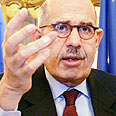
Compromise near on IAEA Israel dispute
Diplomats at international conference say compromise near on resolution singling out Israel for criticism on nuclear activities; meanwhile Syria, Afghanistan battle for seat on board of UN nuclear watchdog agency
Diplomats at a 145-nation conference say that a compromise is near on a resolution criticizing Israel's nuclear activities.
At issue is an Arab draft resolution at the International Atomic Energy Agency conference expressing concern about Israel's nuclear capabilities.
Although Israel has never confirmed it has nuclear weapons, it is widely believed to possess them.
With the conference split on the draft resolution, its introduction would likely force a vote. That would heighten tensions between developed nations backing Israel and developing countries supporting the Muslim countries .
On Wednesday, two participants in the discussion told the Associated Press that the sponsors of the resolution now are willing not to push for its adoption if it can be debated and if the meeting's president then summarizes what was said.
Syria, Afghanistan battle for seat on board
Meanwhile at the conference, despite opposition from the West and the US in particular, Syria appears determined to pursue its bid for a seat on the UN atomic watchdog's board, now that Iran is officially out of the running.
In what is developing to be a looming clash at the International Atomic Energy Agency's general conference here this week, Afghanistan - a US ally - also announced its candidature on Wednesday. Diplomats said Kabul enjoys the support of most of the IAEA's member countries. The matter comes up for discussion on Friday and could be forced to a vote.
Iran had also been seen as a potential candidate, but it pulled out in favor of its staunch regional ally Syria.
For the US and others, however, Syria would be unacceptable because of current allegations it was building a covert nuclear facility at a remote desert site called Al-Kibar until it was destroyed by Israel in
September 2007.
Damascus has yet to clear up the allegations, which it has simply dismissed as "ridiculous". Apart from allowing IAEA experts to inspect the suspect site in a one-off visit in June, Syria has not undertaken any further action to actively disprove the accusations.
"Having Syria on the board would be like having a suspected arsonist oversee the fire brigade," one conference participant told AFP.
The Associated Press and AFP contributed to the report










